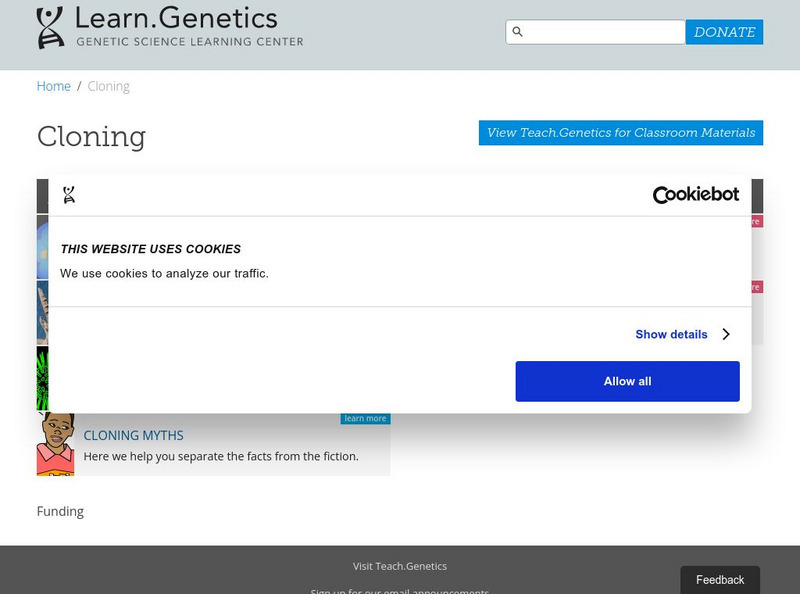Curated OER
Regents High School Examination: Living Environment 2009
Emerging ecologists need a full understanding of life, from the inner workings of a cell to the complex relationships among organisms. This examination is meant to assess high schoolers after an entire year course on the living...
Curated OER
Regents High School Examination: Living Environment 2007
Environmental science enthusiasts show what they know at the end of the year by taking this full-fledged final exam. They answer multiple choice, graph interpretation, and essay analysys questions, 73 of them in all. Topics range from...
Deliberating in a Democracy
Cloning
Students explore the issues and challenges of cloning. In this cloning lesson plan, students read about how cloning affects people and the types of cloning, then they prepare a debate either for or against cloning.
Curated OER
Genetics and Genetic Engineering
Pretty purple slides present a plethora of jargon related to genetic engineering. Most of them have one term across the top and a brief explanation of that term below. They are arranged in alphabetical order, which may not be the most...
Curated OER
Should Humans Be Cloned?
Young scholars explore links on the Internet to collect facts about cloning then prepare an essay on their findings. In this research writing lesson students examine how to include their opinions on what they have found in their...
Curated OER
Stem Cells and Cloning
Learners discuss an article on cloning and stem cells and complete an Internet cloning activity. In this genetic engineering lesson, students analyze stem cell issues by reading an article and participating in a class discussion. They...
Curated OER
Asexual Reproduction
In this reproduction worksheet, students identify the 5 major ways organisms reproduce asexually and list examples of organisms that reproduce in that manor. Then students complete 10 short answer questions.
PBS
Pbs Bloodlines: Technology Hits Home
This site is a must see for any lesson or unit on biotechnology! It is a companion to the PBS video "Bloodlines: Technology Hits Home," although it can certainly be used without the video. It's a fantastic site that will challenge...
University of Utah
University of Utah: Genetic Science Learning Center: Cloning in Focus
This group of pages comprehensively covers the topic of cloning. There is an interactive section about how it's done, some history of cloning technology, important issues in cloning, and even an interactive quiz.
The Association of the British Pharmaceutical Industry
Abpi: Cloning
An in-depth look at cloning and the technology behind it. Students work through interactive learning material, understanding the ethics involved in all types of cloning. There is a suggested classroom activity and a self-checking quiz at...
Cold Spring Harbor Laboratory
Dna Interactive: Chronicles
By looking at the history of genetic engineering, this site hopes to show where eugenics has gone wrong and where we have an opportunity to make it right.
Science Education Resource Center at Carleton College
Serc: Human Cloning: Is It Biological Plagiarism?
This instructional activity guides students to learn the science behind cloning, explore the benefits and consequences of human cloning, and communicate their knowledge and points of view.
American Museum of Natural History
American Museum of Natural History: What Is a Clone? O Logy Card
Flip this interactive card to find questions and answers, fast facts, and other bite-size pieces of information to help you understand cloning.
Other
Eureka Science: Genetic Engineering
Explanation of how genetic engineering works. Analogy with molecular scissors cutting a "sentence" of DNA. Has nice animations.
University of Utah
University of Utah: Learn Genetics: Is It Cloning? Or Not?
Play a game and decide whether the scenario described involves cloning.
CK-12 Foundation
Ck 12: Life Science: 3.18 Cloning
Understand the science and ethics behind human or animal cloning.
Bio Topics
Bio Topics: Cloning of Human Body Parts
Find out if cloning human body parts for the purpose of transplant is possible in this interactive worksheet. Read the information, and then hover the mouse over review questions to reveal the answers.
Other
Eureka Science: Cloning
Read this short article to find out about the history of cloning and genetic engineering. Continue on to the next page to find out how cloning is done. Simple terms and fun animations make it easy to read.
BiologyWise
Biology Wise: The Pros and Cons of Cloning
Discusses the positive and negative aspects and repercussions of genetic cloning.















